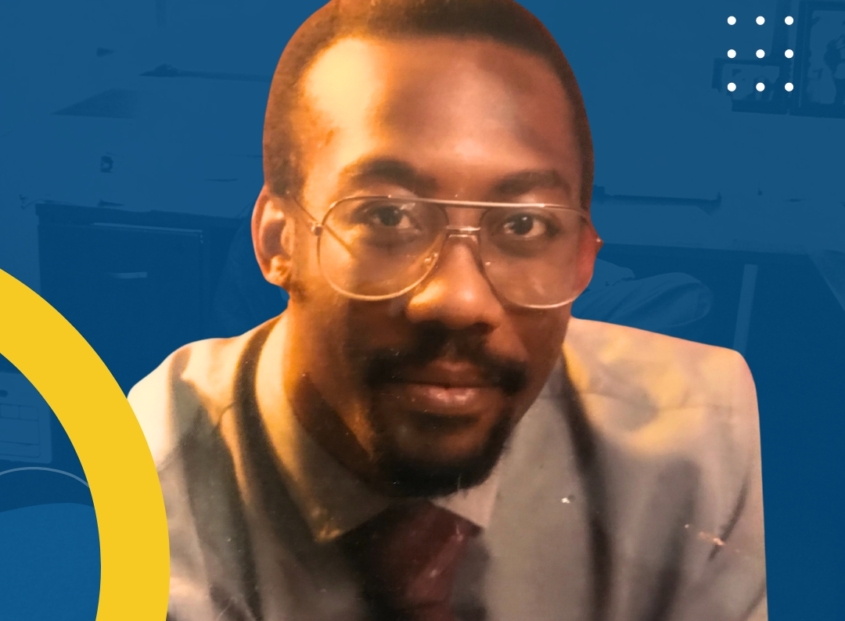Member Spotlight: Larry Warren, IBEW Local 48
Welcome to this edition of our Member Spotlight, where we celebrate the remarkable contributions of our members to their professions.
In the vibrant tapestry of IBEW Local 48’s history, few figures stand as tall as Larry Warren. Retiring from his esteemed position in 2017, Larry’s journey within the union spans decades, marked by unwavering dedication and invaluable contributions.
As a journeyman electrician, foreman, general foreman, superintendent, and project manager, Larry’s expertise and leadership have left an indelible mark on numerous projects and initiatives. Beyond his professional accomplishments, Larry’s role as a mentor and active member of the Electrical Workers Minority Caucus (EWMC) embodies the spirit of camaraderie and support that defines the union’s ethos.
What inspired you to pursue a career in the electrical industry?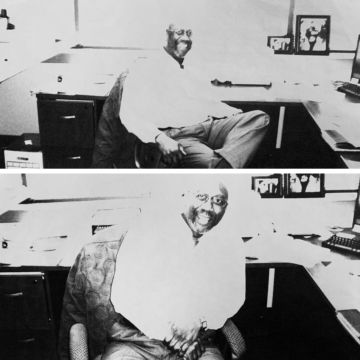
I used to work in the grocery industry while also taking care of my seven kids. The job had demanding hours, with weekend shifts and split schedules. I needed a change, something with a regular eight-to-five schedule and weekends off so that I could spend more time with my family. One day, I was riding an elevator and I overheard someone mention the IBEW. I asked them about it, got some information, and after considering it, decided it was the right career move for me.
“I began my career with a local union associated with retail clerks during my time in the grocery industry. Being part of a union has been a constant in my life. It’s a tradition I inherited from my father, who belonged to the steelworkers union. Working within a union environment has always been my preferred choice.”
I clearly recall the day I went for an interview because it was my birthday. This was back in 1987 or 1988. At the time, I was working as an assistant manager at Safeway. I took time off work to attend the interview, so I was dressed in slacks and a tie when I went for the interview. And I remember walking in and they looked at me and like, okay, are you sure you’re coming to the right place for a job? Do you understand what this work is like?
The job is definitely in the trenches and they wanted to make sure this was something that I wanted to do. I remember telling them that it was my birthday and it would be the best birthday present ever to get into the trade.
How did you know you had a passion for this kind of work?
When I was in fifth or sixth grade, I attended a class at OMSI focused on electricity. We did experiments with positive charges using DC currents, and I remember feeling a slight shock while holding hands with classmates. I did well in that class, despite not having any prior electrical background.
After high school, I joined the military as a medic, initially aiming to pursue a career in medicine. However, those plans didn’t pan out. It’s fascinating how I eventually found myself in the electrical trade by taking a ride in an elevator.
What was your career trajectory like?
So, I started a five-year course to become a journeyman electrician. After completing the course, I worked as a foreman for a while, then moved up to become a general foreman superintendent.
“I was hired to oversee a $22 million project, which encompassed instrumentation, controls, and network, and also included managing the union fitters under my contract. This was a tightly bid project, requiring someone capable of comprehending the entire scope, and I ensured the project’s success.”
Later, I transitioned to an office role as a project manager. Alongside my career, I also worked for the union as an organizer, helping bring in new members. This gave me a well-rounded perspective—I’ve experienced fieldwork, union operations, and management roles in the office. Understanding all sides of the industry really helped me succeed in the industry.
How did being involved with the EWMC impact your career?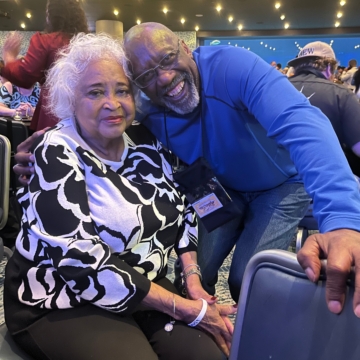
I got involved with the EWMC in the early ‘90s and attended a conference in Atlanta, Georgia. It was there I connected with folks who were all talking about a common issue among minorities in our industry. They often found themselves laid off first when jobs started to wind down.
We brainstormed solutions and talked about how having representation in decision-making roles could help address this. I made a promise to myself during that conference that I would strive for a leadership position.
So, when I returned to my job I spoke with the project manager about the situation we were all facing. I just wanted the chance to demonstrate my ability to fulfill the role of a foreman. He was really receptive and supportive but told me that he didn’t have control over the decisions made by the general foreman regarding who was selected.
However, I ended up being the first foreman on the next project and made a deliberate effort to include minorities and women on my crew, earning us the nickname “Tuskegee Wiremen.” I thought it was funny, but in this day and age, people might not take it the same way.
“Don’t be scared to get into a position of responsibility. I would just say, you know, reach for it. Go after it. Don’t cut yourself short.”
Subsequently, I left that job to help out on another project at Kaiser. It was clear that the person in charge of the project wasn’t very capable. I helped out a lot with the drawings and everything and they realized he wasn’t going to work out. So they fired him. But instead of promoting me, they hired someone else. I decided to quit that job and when I got downtown, Ken Jacobs was in the office and asked me about the pink slip I was holding. I explained what happened. He took it seriously. He looked at my pink slip and said “Gimme that.”
The next thing I knew, I was offered a position running the Nabisco factory project, which I held for about two years before transitioning to Reynolds Metals and eventually becoming a project manager. Actually, I got the opportunity to interview for that position from Ken Jacobs who had taken my pink slip and stopped me from going back to the hall.
Of course, at that time, I didn’t have any computer skills and I was a little skeptical about accepting the position because I knew you had to do a lot of stuff on computers, like the drawings and a lot of other technical work. But I had a friend named Ricky Brame and he’s been involved with the EWMC for years and still is.
And I remember talking to him on the phone saying that I didn’t know if I could do it. And, you know, he said something that made a lot of sense. He reminded me that I could always return to the field if things didn’t work out. That assurance gave me the confidence to pursue new opportunities and led me to a successful career in management. I always tell people today that everything we do in life is a learned process so don’t be afraid of the challenge you can learn it like any other job you are trained for.
So being involved with the EWMC was both empowering and helped me know my worth.
Is there a particular project you’ve done that you’re especially proud of?
I was hired by Curtis Stephens at Rosendin Electric to oversee a $22 million project, which encompassed instrumentation, controls, network, and also included managing the union fitters under my contract. They were aware that this was a tightly bid project, requiring someone capable of comprehending the entire scope, and I ensured the project’s success. While I managed several million-dollar projects, this one was, in my opinion, the most challenging.
You were also a mentor during your career. Is there an experience that stands out you’d like to share?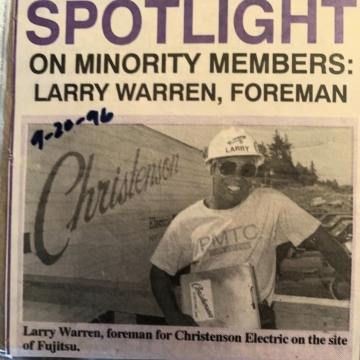
Oh, absolutely. So, there’s a company called Affordable Electric. It is owned by an African American gentleman who started his own business but faced challenges with bidding jobs and securing work.
I spent time with him because I became quite proficient with the AccuBid program, which is essential for bidding work and competing in the market. I mentored Jean and helped him understand the AccuBid program better, identifying areas where he was duplicating efforts unknowingly. Jean started his business around 20 years ago, if not more, and we’ve been friends ever since.
Is there any advice you’d pass on to kids thinking of entering the trades?
You know, number one, I think the trades are the way to go. And it’s important to know that there are several different avenues within the trades. It’s not just going out and just physically working. There are a lot of different career paths. I would also say that you need to make sure you have your math skills together and prioritize being on time.
“You have to learn it to achieve it.”
I worked as a head coach for a track and field program at a local high school here in the Portland metropolitan area. When I was coaching track, I was tough. The kids loved me but they also knew that if they weren’t at practice on time there were things that were not going to happen—like, you’re not running in the meet. I’ve always felt that beyond winning a race or an event, the true value lies in the character development and the potential for shaping future role models among our young adults.
Another thing is being social. Little groups form in the trades and on job sites, so sociability is important. I mean, you don’t have to hang out with them, but you’ve got to work with them. Communicating, being approachable, and being social makes a difference while you’re on the job.
How’s retirement treating you?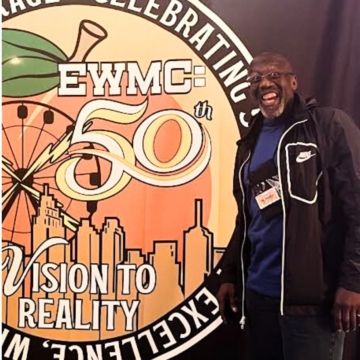
Not only did I have a great career, but my union benefits still take care of me and my family.
One of the significant benefits that many people overlook is the medical coverage. It didn’t cost me anything for medical coverage after retirement which was at 59 until I turned 65 and transitioned to Medicare. Interestingly, even though I’m no longer covered, my wife who was only 54 at the time still has excellent coverage until she turns 65 at no cost to us. Another benefit of being in a union.
My benefits extend beyond just financial compensation. There are four pension plans, which become especially valuable during retirement since social security alone isn’t sufficient. With many employers moving away from offering benefits and pension plans, it’s essential to plan for the future. Social Security payments are often minimal and can be wiped out real quick if you’ve got expenses like car payments and insurance. It’s crucial to consider the long-term benefits of being part of a union like IBEW, despite the physical demands of the work.
Anything else you’d like to share with folks reading this?
At the end of the day, a lot of people are intimidated to pursue a position of responsibility. So, I just want to say reach for it. Go after it. Don’t cut yourself short. Don’t stay at the bottom where you’re always going to be told what to do or guided in a direction you didn’t choose.
You have to learn it to achieve it.
About Larry Warren
Retired Journeyman Electrician with IBEW Local 48
Connect with Larry on Facebook.
About the NECA/IBEW Local 48 Partnership
The collaboration between the Oregon-Columbia Chapter of NECA and IBEW Local 48 is propelling the electrical industry forward, prioritizing integrity, quality, safety, and professional expertise. To learn more about membership opportunities, please visit our membership page.

